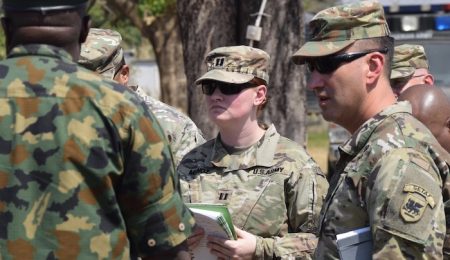The Minister of Foreign Affairs, Yusuf Tuggar, Thursday bemoaned the low level of intra-African trade, put at 18 per cent, despite a combined continental Gross Domestic Product (GDP) of about $2.8 trillion.
In a keynote on the second day of the 2025 Gender Inclusion Summit organised by the Policy Innovation Centre (PIC) in Abuja, Tuggar who spoke on the theme: “From Aid to Investment Leveraging Economic Diplomacy for Africa’s Inclusive Development,” argued that women, who make up 70 per cent of the informal economy, remain largely excluded from the benefits of formal trade.
“Africa stands at the cusp of transformation. With a combined nominal GDP of $2.8 trillion and a population projected to reach 2.5 billion by 2050 an increase of 67 per cent in just one generation our continent possesses the resources, human capital, and creativity to drive global growth.
“Nigeria, one of Africa’s largest economies, with a GDP of N372.8 trillion, approximately $243 billion USD, occupies a strategic position in shaping this trajectory. There are, however, challenges associated with the actualisation of the Continent’s full potential.
“In Africa, intra-African trade accounts for only 18 per cent, compared to 59 per cent in Asia and 69 per cent in Europe. Women, who make up 70 per cent of the informal economy, remain largely excluded from the benefits of formal trade,” Tuggar stated.
According to him, just over two-thirds of girls (69 per cent) versus 73 per cent of boys completed primary education in Africa, and a lower proportion, 43 per cent of girls compared to 46 per cent of boys, completed lower secondary school, quoting UNESCO’s 2024 report.
The report, he said, noted that 7.6 million Nigerian girls are still out of school, with the Northwest and Northeast accounting for nearly half of that number.
Tuggar maintained that African women hold just 27.3 per cent of parliamentary seats, and fewer than a quarter of executive positions in the banking and finance sector. In Nigeria, the percentage of women in the National Assembly, he disclosed, is even lower, with just 4.2 per cent representation.
Quoting a 2019 report by the Council on Foreign Relations’ (CFR) Women and Foreign Policy Program, titled “Growing Economies Through Gender Parity,” he stated that this report predicted an astounding 23 per cent surge in Nigeria’s GDP, equivalent to $229 billion by 2025 if women participate in the economy at a level commensurate with men.
“These statistics not only highlight the gender disparities in critical sectors that contribute to the continent’s productivity, but more importantly, indicate that to fully harness the benefits of our growing population for economic growth, there is an urgent need to intentionally address gender disparities. The data further reminds us of a simple truth: growth without inclusivity is fragile and prosperity without equity is unsustainable.
“In light of this realisation, Nigeria, as Africa’s most populous nation and with immense economic potential, required a foreign policy with a fresh, all-inclusive purpose. This led to the recalibration of our diplomatic strategy, culminating in President Bola Ahmed Tinubu’s 4-D Diplomacy agenda. This framework encompassing Development, Demography, Diaspora, and Democracy reimagines Nigeria’s global engagement, ensuring each pillar prioritises the inclusion of women and youth.
“As a direct outcome of this vision, our diplomatic efforts now include the Regional Partnership for Democracy (RPD).
“This flagship initiative addresses democratic challenges within the region by strengthening institutions, promoting inclusive participation, and fostering accountable governance. Central to its mission is ensuring the equitable participation of women and youth, thereby building sustainable and resilient systems that draw on the contributions of every demographic for Africa’s political and economic stability,” the minister stated.
Earlier this year, he said that Nigeria hosted the West Africa Economic Summit (WAES) in Abuja, reaffirming its commitment to regional integration and the harmonisation of trade and investment policies to make West Africa a hub of shared prosperity.
With heads of state, industry leaders, and development partners in attendance, the summit, he recalled, resolved to create an enabling environment for women’s economic empowerment, dismantling barriers to finance, markets, and cross-border opportunities, while mainstreaming gender-responsive policies across all regional integration efforts.
“While we celebrate milestones such as the African Continental Free Trade Area (AfCFTA) and the Pan-African Payment and Settlement System (PAPSS), these advancements risk leaving a significant portion of our population behind.
“The very systems designed to boost continental trade can become new barriers if women lack access to Development Finance Institution (DFI) funding, financial literacy, and market networks,” he argued.
In terms of youth inclusion, he stated that Nigeria has launched several key initiatives, explaining that the conversation today is not just about identifying challenges; but about committing to action towards truly unlocking Africa’s potential.
“First, we must all work towards increasing and promoting the meaningful participation of women in politics. A 4.2 per cent share of parliamentary seats is unacceptable. True democracy is about equitable representation, and we must dismantle the systemic barriers that prevent women from holding leadership positions, including through legal reforms that explicitly protect their rights to property and political office,” he stressed.
Emmanuel Addeh
Follow us on:


